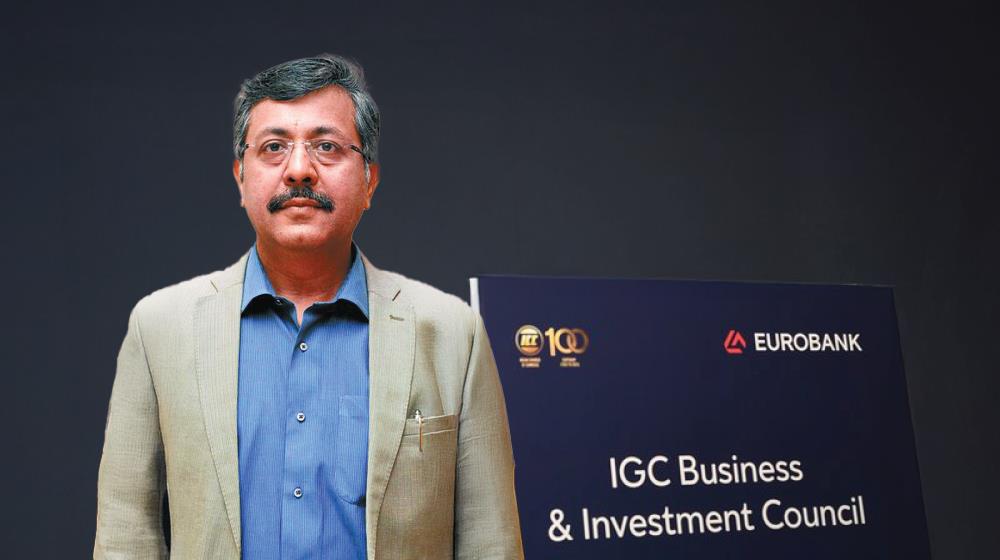The India–Middle East–Europe Economic Corridor's (IMEC) significant prospects and the role expected to be played by the newly established India–Greece–Cyprus (IGC) Business & Investment Council have been described by Dr Rajeev Singh, Director General at Indian Chamber of Commerce and Head of the IGC Council.
He was speaking to the Athens newspaper Ta Nea.
As Singh explains, the IGC Council, by facilitating interstate trade and capital movement between India, Greece and Cyprus, will contribute to leveraging the advantages of IMEC, thus creating a strong regional value chain for India, with benefits in a number of sectors of the Cypriot and Greek economies.
Regarding Cyprus in particular, Singh highlights the competitive advantages of τηε country that have made Cyprus an attractive investment destination for Indian companies.
Below is Dr. Rajeev Singh's interview with journalist Petros Konstantinidis, published in Ta Nea, on 31 May, 2025, as part of a special feature on India and translated into English by CBN.
What is the importance of the India-Greece-Cyprus Business Council (IGC) for India?
To answer this question, we must first understand India's geoeconomic position. India is projected to continue to be the fastest-growing major economy in the world in 2025 and 2026.
India's GDP is expected to grow by 6.2% in 2025 and 6.3% in 2026, while global economic growth is estimated to be much lower, at 2.8% in 2025 and 3.0% in 2026.
India's resilience and consistency depend on its strong macroeconomic fundamentals and strategic government initiatives. International trade and investment are a major driver for the Indian economy.
In this regard, the India-Middle East-Europe Economic Corridor (IMEC) emerges as a trade route with great potential, which proposes to reduce supply chain costs (up to 30%) and reduce freight transport time (by 40%).
The IGC Council, by facilitating interstate trade and capital movement between India, Greece and Cyprus, will contribute to leveraging the advantages of IMEC, thereby creating a strong regional value chain for India.
Multiple sectors are set to benefit from the initiative, such as tourism and hospitality (ie. hotels), shipping and logistics, Renewable Energy Sources (RES), pharmaceuticals and biotechnology, agriculture and food processing, IT and start-ups, infrastructure, cultural industries, defense and aerospace.
The multiplier effect of the transnational initiative in achieving the sustainable development goals will be significant.
Why Cyprus and Greece were chosen
Why were Greece and Cyprus chosen as gateways to the EU for Indian businesses? What do these countries offer to India?
Due to their strategic location, Greece and Cyprus are maritime gateways to Europe and the Arabian Gulf and, therefore, natural entry points for Indian businesses.
The port of Piraeus in Greece is a potential gateway for Indian businesses to the EU. Greece's Golden Visa programme, which grants residence permits in exchange for real estate investments, is a particular attraction for Indian citizens.
Greece recorded a 37% increase in property purchases by Indian investors between July and August 2024.
Greece offers scope for investment in sectors such as tourism, energy, IT, life sciences, food and agricultural products, logistics, audiovisual productions - sectors in which Indian businesses have active interest and experience.
Finally, there is the political will to create a strategic partnership between India and Greece with a shared vision to double the volume of trade between the two countries by 2030.
Strategic location, strong infrastructure, favorable tax regime, conducive business environment and skilled workforce are the key factors attracting Indian businesses to Cyprus, a European base.
Indian businesses have a significant presence in the IT, financial services, pharmaceuticals and construction sectors in Cyprus.
Additionally, Indian companies are finding interest in sectors such as shipping, energy and technology. Cyprus offers one of the lowest corporate tax rates in the European Union, at 12.5% today.
The competitive tax rate, along with a network of more than 60 double taxation agreements with countries around the world have made Cyprus an attractive investment destination for Indian companies.
IMEC's role and next steps
How important is IMEC to the IGC Council, and what are the next steps?
IMEC is of primary importance in this collaboration. The uniqueness of the initiative lies in the fact that it respects sovereignty and territorial integrity. We must examine IMEC through the lens of Public-Private Partnerships to give it the fruition it deserves.
The need for a collaborative model with the private sector in the driving seat, bringing real-world expertise, requirements and innovation to the table, highlights the importance of the IGC Council.
Secondly, the need for greater alignment between countries in terms of trade and customs procedures and bureaucracy brings to the fore the need for effective coordination between businesses and governments (Business-to-Government, B2G), as envisaged by the Council.
The Council will support actions on system interoperability, digitalisation, electric vehicle charging ecosystems and regulatory alignment to unlock economies of scale in trade and investment. India's unified payments system, UPI, could serve as a model for enabling seamless financial transactions between countries.
Multilateral financing institutions will be part of IMEC given the mammoth financing needs, while the Council will seek to create opportunities for innovative financing mechanisms, such as green bonds and blended finance.
The Council's active participation and knowledge are essential to highlight the real needs of businesses. This will contribute to the promotion of industry best practices and the better integration of trade and investment partners, in the context of cooperation between countries.
Support from Prem Watsa
What was the role of Indo-Canadian businessman Prem Watsa in creating the collaboration with Eurobank and, therefore the one with Greece and Cyprus?
Prem Vatsa's investments and Fairfax's presence have created the foundation for Eurobank's initiatives in Greece and Cyprus, leading to increased business activity and economic opportunities for these regions. He has provided strong support for this initiative.
(Source: InBusinessNews)









